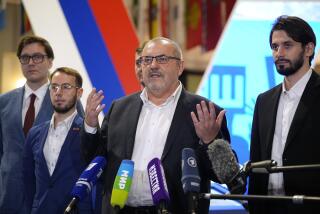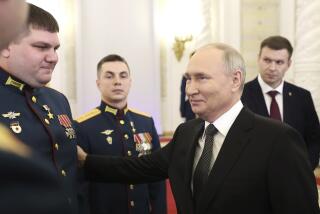Triumphant Yeltsin Wants to Lead Kremlin’s ‘Loyal Opposition’
- Share via
MOSCOW — Boris N. Yeltsin, the maverick Communist Party politician whose radical populism brought him a dramatic victory in the Soviet Union’s parliamentary elections, immediately set out Monday to become the leader of what may in future be called “the loyal opposition” in the country’s new legislature.
After winning a stunning 89% of the 5.7 million votes cast in Moscow’s citywide constituency in the Congress of People’s Deputies, Yeltsin declared his candidacy for the Supreme Soviet, the new, full-time legislature to be elected next month by members of the congress.
From there, he hopes to form a group of like-minded deputies, interested both in better meeting the demands of what he calls “social justice” and in accelerating the country’s political, economic and social reforms to a pace faster than favored by the Communist Party leadership.
And this could make Yeltsin, 58, a plain-spoken, burly construction engineer from Siberia who reached the party’s top ranks before breaking with the leadership, the focus for those critical of the party, its policies and style and looking for political alternatives.
“This has given perestroika (restructuring) greater urgency,” an ebullient Yeltsin said of his victory as supporters and journalists crowded into his central Moscow office. “When nearly 90% of the people make clear their views, how can you ignore them? We will proceed now with what the people want.”
Even before the election, he calculated he could put together a bloc of perhaps 30 or 40 deputies in the Supreme Soviet. That is not quite a tenth of the likely membership, but it holds the potential for what Yeltsin described as “a very active, very influential and perhaps strategic force.”
“We can perhaps take positions that will have an impact on (party and government) policy, positions that cannot be ignored,positions that we can present quite effectively, quite forcefully,” he told The Times in a pre-election interview. “Don’t worry--Yeltsin is not going into the Congress of People’s Deputies to sit quietly. I am not that type of man.”
He also talked Monday of forming alliances with other groups--the nationalists from the Baltic republics of Estonia, Latvia and Lithuania, other rebels who have won in cities scattered around Russia and the Ukraine, the environmentalists from across the Soviet Union.
His first task, however, will be to win election to the Supreme Soviet from the Congress of People’s Deputies, a body of 2,250 that will hold “supreme authority” but will generally meet only once a year.
About 450 deputies are expected to be elected late next month to this new legislature, but the exact number and the procedures are not yet known. As the overwhelming winner in the country’s biggest constituency, Yeltsin has a good claim for inclusion, but Monday he described this as “my next struggle” against party leaders who may try to keep him out.
Yeltsin had run on a platform calling upon the government to concentrate its resources on improving living standards and focusing economic development far more narrowly than in the past. He called for massive cuts in defense spending and in the space program--with the money to be transferred to the civilian sector--and for even greater cuts in industrial construction, which has long been the motor of economic growth here.
But most of all, he had campaigned against the special privileges enjoyed by party and government officials and against the rampant corruption in Soviet society, particularly at official levels.
He supported President Mikhail S. Gorbachev on foreign policy and on the overall strategy for perestroika, Yeltsin told The Times this month, but he differed on some priorities and on many points of tactics.
His election rallies grew from hundreds at the start of the election campaign to more than 10,000 on Saturday, the day before voters went to the polls.
But as his popularity became increasingly evident, the party apparatus grew more and more worried. He had to fight for his nomination and then for every meeting hall while his opponent, the director of an automobile plant, here, benefited from the party’s full organization powers.
Prevented from holding public rallies, Yeltsin’s supporters took to the streets, demonstrating twice last week in front of the Moscow City Hall. Finally, battalions of younger soldiers were brought into Moscow to vote against him.
“You can’t fool the people,” Yeltsin said Monday. “The more certain comrades in the apparat (party) tried to defeat Yeltsin, the more that the people were determined that Yeltsin should be elected and they should be heard. So be it.”
Yeltsin was brought to Moscow by Gorbachev in 1985 to clean the political hacks out the local party machine built under the late Leonid I. Brezhnev and to crack down on corruption.
But he was denounced by Gorbachev for his “over-weening ambition” and dismissed as the Moscow party leader in November, 1987; he was later removed as a candidate, or non-voting, member of the ruling Politburo and given the ministerial-level post of deputy chairman of the State Construction Committee.
“To be a people’s deputy, I would happily give up this job, this office and all of the paper work that go with them,” Yeltsin said earlier this month. “To be a people’s deputy, to speak for the people in Parliament, that is what I want.”
More to Read
Sign up for Essential California
The most important California stories and recommendations in your inbox every morning.
You may occasionally receive promotional content from the Los Angeles Times.













